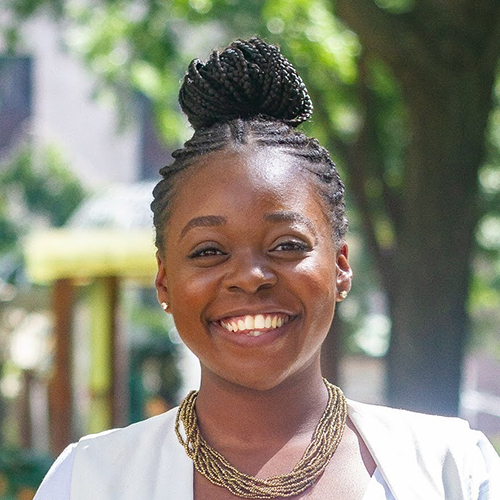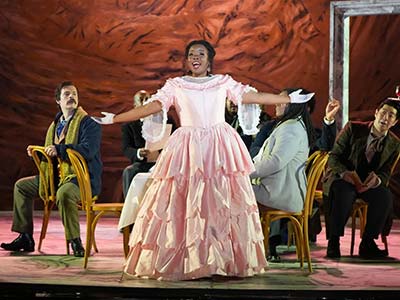Melissa Joseph is an outreach specialist at Wiki Education, where she leads strategic campaigns to connect scholars and scientists with opportunities to contribute to Wikipedia. With a background in nonprofit education work and partner management, she brings over five years of experience in digital outreach, student support, and relationship building. Alongside her role at Wiki Education, she maintains an active career as a professional opera singer, performing across the U.S. and internationally while working remotely to expand access to public knowledge.
On a cold winter afternoon in Galesburg, Illinois, I found myself in the lobby of a historic theatre, earbuds in, laptop open, sending a final email to potential course applicants before heading into dress rehearsal. It wasn’t unusual. In fact, this kind of moment has become the norm. As both a working opera singer and the Outreach Coordinator for Wiki Education’s Scholars & Scientists program, I split my time between the stage and the screen, balancing rehearsals, voice lessons with Zoom meetings, emails, and Pardot email campaigns.

What may seem like a logistical challenge has actually become an unexpectedly smooth rhythm. It allows me to use my voice in two powerful ways: performing on stage and helping experts amplify their knowledge through Wikipedia.
Much of my day-to-day work at Wiki Education involves outreach. This includes inviting subject-matter experts, scientists, and researchers to participate in our programs and make their knowledge publicly accessible through Wikipedia. At the heart of that outreach is email. But sending out emails isn’t as simple as it may seem.
Each email I craft is tailored with intention. It’s not just a matter of announcing a course and dropping a registration link. I ask myself: Who are we trying to reach? What kind of scholars will resonate with this course theme? What language will make them feel seen, valued, and empowered? What questions can I answer on the front end? Whether the course is focused on public health, civics and democracy, or climate finance, the message needs to reflect the course’s impact and speak to the values of the people we’re inviting.
Given my schedule, I often work on these campaigns in bursts. Between rehearsals and voice lessons, I’m often drafting email language or tweaking a call-to-action. Crafting a compelling subject line or preview text might seem small, but it’s often the difference between an email being opened or ignored. I view it as an extension of storytelling, not unlike the way I approach a character or scene on stage. The stakes are different, but the goal is the same: reach the audience where they are and move them to action.

My opera career has taken me to many places around the world: from the sunny shores of California, the flatlands of Illinois (I’m writing this from the historic Studebaker Theatre in Chicago), to the rolling hills of Prešov, Slovakia. From all of those places, I’ve brought Wiki Education along for the ride. I’ve conducted Zoom meetings in practice rooms, taken calls from green rooms, and answered Slack messages from almost every subway station in NYC. Remote work isn’t always easy, but I’ve found ways to make it sustainable, largely thanks to strong communication with my team and a shared understanding of our goals.
Working in a flexible role like this is a gift, but it’s the structure and ownership I bring that makes it work. Juggling multiple outreach campaigns, tracking applications, maintaining documentation, and continuously refining our process is all in a day’s work. One of my favorite responsibilities is sending certificates to participants who complete our courses. It may seem small, but it marks a meaningful milestone: the moment someone becomes a contributor to public knowledge through Wikipedia.
When I tell people I work in outreach for Wikipedia courses, I sometimes get puzzled looks. But when I explain that we’re helping academics and researchers contribute to one of the most visited websites in the world, helping ensure that public knowledge is accurate, equitable, and expert-informed, those looks quickly change to excitement.
The Scholars & Scientists program isn’t just about editing Wikipedia. It’s about shifting the culture of knowledge. It’s about closing content gaps, especially for underrepresented topics and communities. And it’s about equipping people who have deep expertise with the tools they need to share it broadly and accessibly.
While I don’t always hear directly from participants after the course ends, I take pride in knowing that the work I support helps bring more informed voices to Wikipedia. I know that behind every campaign and every accepted application is someone who will make knowledge more accurate, inclusive, and accessible. Watching our course rosters fill with scholars and scientists from underrepresented fields reminds me why this work matters and why it’s worth every carefully crafted email.
Balancing two careers isn’t always easy. There are days when I feel like I’m in two worlds at once: running from rehearsals to coffee shops to run Salesforce reports, or going from a staff meeting straight into a performance at the Kennedy Center. But what keeps me grounded is that both roles are ultimately about connection. Whether I’m singing a solo or sending a campaign email, I’m trying to reach people, tell a story, and invite them into something bigger.
My journey with Wiki Education has taught me that the best outreach doesn’t happen through automation or one-size-fits-all messaging. It happens through curiosity, empathy, and listening. It happens when we meet people where they are and show them how their voice, academic, artistic, or otherwise, can make a real difference.
And as someone who works across disciplines, across time zones, and across stages, I wouldn’t have it any other way.
Visit learn.wikiedu.org to explore Wiki Education’s editing courses for subject matter experts.
